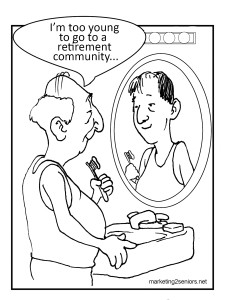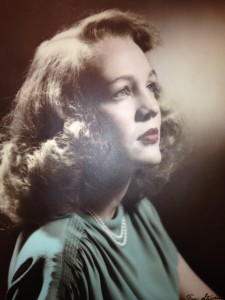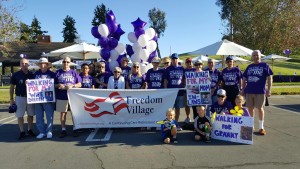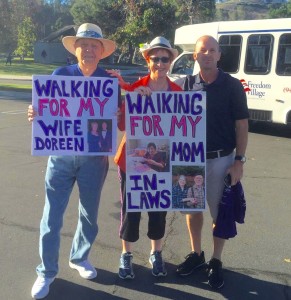
by Diane Masson | Dec 20, 2015
 A former cop moved into my mother-in-law’s memory care community. He was doing simulated punches to people including the administrator. The administrator was worried the punches might become real, because seniors with dementia do not have good depth perception. Then my sister-in-law witnessed him doing it to my mother-in-law, Amy. She was horrified.
A former cop moved into my mother-in-law’s memory care community. He was doing simulated punches to people including the administrator. The administrator was worried the punches might become real, because seniors with dementia do not have good depth perception. Then my sister-in-law witnessed him doing it to my mother-in-law, Amy. She was horrified.
My sister-in-law was sitting across from her mom. The former cop came up from behind my sister-in-law and then she saw a fist heading for Amy’s face. The fist stopped six inches away. Here is the weird part. A caregiver witnessed the whole thing, but showed no concern, never said a word, or redirected him. He did walk away and the caregiver accompanied him down the hall. My sister-in-law shouted, “That was not cool,” after them.
So the staff started locking residents’ rooms because they caught the former cop standing over sleeping residents. The doors were locked at night so residents could still wander out, but he could not wander in.
Something combative must have happened between the former cop and a staff person. They would not say what but my sister-in-law observed that he was gone over a day and then came back drugged. All these situations have transpired over two weeks.
My sister-in-law is very worried about Amy. What if she gets up in the night and leaves her room? What if the former cop is out too? Amy will have nowhere to go because every door is locked. A few days ago my sister-in-law discovered the doors to the residents rooms were locked during the day. She shared her disapproval with the administrator. The administrator said it was because both residents were asleep in the room (which they were doing at the time). My sister-in-law said to the administrator, “You said you would only lock the doors at night.”
Who is protecting the residents? The community says they cannot provide one-on-one care for the former cop. They say he has rights too and just can’t make him leave. If another violent incident happens he will be thrown in jail because there is a 49-day wait for a geripsych hospital.
One caregiver shared that the former cop pointed to himself and then her. Then he made gestures of sexual intercourse. He tried to grab her behind, but she wouldn’t let him. Other caregivers do let him grab their behinds and laugh. This is very concerning to our family, because how can someone with dementia distinguish who is a caregiver and who is a resident? He should always be redirected on proper behavior. He is not. There is no redirecting consistency with the caregiving staff.
When my sister-in-law shared the above examples with the administrator she said, “The caregivers are burned out and fearful of him. I am glad you told me and I will talk to staff about consistency.”
The family called the omsbudman and the state. The state triggered a call back to the family from adult protective services. They wanted to know if Amy was afraid. The answer was yes!
Recently, Amy was watching the fish swim in the 100-gallon tank. The former cop came up behind her and grabbed both of her arms. She screamed. My sister-in-law heard the story from a caregiver. Here was Amy’s interpretation to her daughter: Amy said, “A drunk guy grabbed me and tried to beat me up.” She pointed to the former cop and said, “There is that bad man, I don’t like him.”
Is the facility doing all that they can and should? Should this guy be gone? How much violence is okay in a licensed assisted living community in Washington State?
Any answers would be much appreciated.
Diane Masson is a senior living expert who has authored two 5-star rated books. Her new book is an all-encompassing answer guide for seniors called, “Your Senior Housing Options,” designed to help seniors navigate choices quickly. The second book was written for senior living professionals called, “Senior Housing Marketing – How To Increase Your Occupancy and Stay Full.” Reach out to her through her website: Tips2Seniors.com and read the weekly blog.

by Diane Masson | Dec 6, 2015

Do they prefer tea or coffee?
Last week the Tips2Seniors blog discussed: “Seniors in Denial, Relying on Friends and Family.” Every single one of us knows a senior who is struggling in their home. Some seniors silently suffer and others have a whole network of support from family and friends.
Ultimately when a loved one or neighbor tries to have “The Talk” with the senior it can have five typical results:
- Denial: “I am not ready yet. I am just fine living in my own home.”
- Shutting down: “I don’t want to discuss this.”
- Anger: “Why are you questioning my ability to be independent? Leave me alone.”
- Confusion: “Don’t you want to come see me everyday? I don’t understand.”
- Acceptance: “I understand that I have become a burden. Maybe it’s time to look at what my senior housing options could be. Will you help me look?”
In my 17-year senior housing career, sons, daughters and spouses have asked me the same question, how do I have “The Talk.”
Here are my 7 Tips to have “The Talk.”
- Set the stage for “The Talk”. You know if it is better to have “The Talk” in public or private with your senior.
- Public talk: Take them out to eat in a public location (so they can’t yell at you or they can’t escape into their bedroom).
- Private talk: Buy or make your seniors their favorite cookies. Serve the favorite cookies with their special coffee or tea at their dining room table.
- Tell your senior how much you love them.
- Then share your concerns, be very factual. Such as:
- You have fallen twice.
- You missed your medications three times this week.
- I come over here every day to help you.
- Explain your fears in loving detail. Every day when I call you my heart stops till you answer the phone on the third ring. I can’t handle the stress. It is making me sick with worry. I can’t keep this up. If something happens to me, you will be in jeopardy. (It is okay to cry and show your emotions. This is very emotional.)
- Recommend a solution to explore senior housing options together. I know you don’t want to move but it will be healthier for you and healthier for me. Let’s do this together.
- There is a book that can teach us how to find a great retirement community versus a mediocre one. Here’s the book, it is called, “Your Senior Housing Options.”
Depending on your senior, read it to them or you each read it on your own. Use the tips and advice in the book to find the best senior housing arrangement.
- Schedule a luncheon tour at a local retirement community that you have vetted with the tips from the book, “Your Senior Housing Options.”
If this article struck a cord with you, please share it on social media to help a friend or neighbor going through a struggle with a senior.
Give the gift of knowledge: “Your Senior Housing Options,” is an easy read with illustrations. It walks seniors and their adult children through the costs and pitfalls of navigating senior housing and includes the “7 Deadly Sins of Searching for Senior Housing Options.”
News Flash: Diane Masson’s interview on Generation Bold Radio broadcasted on Sunday, December 6th on the BizTalkRadio Network syndicated to 33 stations across the country.
Diane Masson is a senior living expert who has authored two 5-star rated books sold through Amazon. Her new book is an all-encompassing answer guide for seniors called, “Your Senior Housing Options,” designed to help seniors navigate choices quickly. The second book was written for senior living professionals called, “Senior Housing Marketing – How To Increase Your Occupancy and Stay Full.” Reach out to her through her website: Tips2Seniors.com and read the weekly blog.

by Diane Masson | Nov 29, 2015

“I am not ready yet.” Illustration courtesy of, “Your Senior Housing Options” book.
Every single one of us knows a senior who is struggling in their home. Some seniors silently suffer and others have a whole network of support from family and friends.
- Daughters may call their mom once a day to inquire if her senior parent is okay OR no answer could mean they fell again and need help.
Result: Senior falls often lead to fractured hips, 911 calls, skilled nursing care with physically therapy and needing 24/7 care.
- A son may set his senior parent up with medications in a pillbox and then call two or three times a day to make sure his parent has taken them.
Result: This can be effective until the senior says, “What are these pills for? I don’t want to take them.” Most family members are not there in person twice a day to make sure the senior ingests the pills.
- Kind neighbors may make an extra plate of dinner every night and take it to their senior neighbor.
Result: Neighbors get frustrated and burned out, spending every single night away from their own family for one year or more. This type of support can’t go on and on.
- Daughters may spend every other Saturday cleaning mom’s house, grocery shopping and setting up her senior parent to survive for another two weeks.
Result: Even if the daughter lives two hours away, this type of help eventually turns into every Saturday. If the daughter works full time, it can never be daily help, then what?
What is the answer to a senior struggling to manage in their home?
Result: It’s time to talk turkey with a senior.
There are five typical results in having “The Talk” with a senior:
- Denial: “I am just fine living in my own home. I am not ready yet.”
- Shutting down: “I don’t want to discuss this.”
- Anger: “Why are you questioning my ability to be independent? Leave me alone.”
- Confusion: “Don’t you want to come see me everyday? I don’t understand.”
- Acceptance: “I understand that I have become a burden. Maybe it’s time to look at what my senior housing options could be. I am tired of being lonely. Will you help me look?”
In my 17-year senior housing career, my teams and I have helped thousands of seniors improve the quality of their life by making a planned move into an independent living, assisted living or Continuing Care Retirement Community. No one ever chooses memory care or skilled nursing, but those are options for many seniors (like my own in-laws) who waited too long and ended up in a health care crisis. Both my in-laws were hospitalized simultaneously in different hospitals and both their doctor’s told them they needed 24/7 care and could not return home. There was so much unnecessary suffering in my family and I don’t wish it on anyone. Such as my mother-in-law with dementia being given psychotropic medications (they don’t mix well). She has never been the same. Maybe my experiences can save you from a senior health care crisis?
Next week my blog will feature: 7 Tips to have “The Talk” with a Senior.
If this article struck a cord with you, please share it on social media to help others. If you have a friend or neighbor going through a struggle with a senior, let them know about next week’s blog.
Give the gift of knowledge: “Your Senior Housing Options” is an easy read with illustrations. It walks seniors and their adult children through the costs and pitfalls of navigating senior housing and includes the chapter on the “7 Deadly Sins of Searching for Senior Housing Options.”
News Flash: Diane Masson’s new interview on Generation Bold Radio will broadcast on Sunday, December 6th on the BizTalkRadio Network syndicated to 33 stations across the country.
Diane Masson is a senior living expert who has authored two 5-star rated books sold through Amazon. Her new book is an all-encompassing answer guide for seniors called, “Your Senior Housing Options,” designed to help seniors navigate choices quickly. The second book was written for senior living professionals called, Senior Housing Marketing – How To Increase Your Occupancy and Stay Full. Reach out to her through her website: Tips2Seniors.com and read the weekly blog.

by Diane Masson | Nov 8, 2015
 Yesterday, I had the pleasure of hearing Dr. Steven G. Potkin speak about a new Alzheimer’s study to prevent Alzheimer’s at Angel Stadium of Anaheim. Wow, I hope this study is successful.
Yesterday, I had the pleasure of hearing Dr. Steven G. Potkin speak about a new Alzheimer’s study to prevent Alzheimer’s at Angel Stadium of Anaheim. Wow, I hope this study is successful.
Dr. Potkin said that I could share all the information with you because he is currently seeking senior candidates who are 65 to 85 years of age (with normal memory) for this clinical study on Alzheimer’s disease (AD).
He is investigating a new drug intervention that may reduce the impact of a protein known as “amyloid” or “beta amyloid” forming plaques in the brain. Scientists believe that accumulation of amyloid in the brain may play a key role in the eventual development of AD-related memory loss.
Dr. Potkin is conducting the research study at the University of California Irvine (UCI) Medical Center in Orange, California. It is called the Anti-Amyloid Treatment in Asymptomatic Alzheimer’s study (the “A4” study for short) for seniors who may be at risk for memory loss due to AD.
A senior participant and his or her study partner need to be willing to be part of a three-year study. The study partner (must have frequent contact with the senior participant) would describe changes in the senior participant’s health to the study staff on a weekly basis.
There will be a PET scan at the initial screening meeting and at the conclusion of the three-year study to determine whether the senior participant has evidence of an elevated amyloid build-up. Senior participants will also receive monthly study drug infusions.
For more detailed information and the total compensation for completing the study, please contact Andrea Weideman with Dr. Steven G. Potkin’s Reseach Team at: 714-456-5697
My mother-in-law has Alzheimer’s and I pray this research can prevent future seniors from getting AD in the first place. Good luck to Dr. Potkin and the whole research team at UCI.
During my time with Dr. Potkin, he commended me for writing the book, “Your Senior Housing Options,” and said it is a much needed resource for seniors.
Diane Masson advocated for her mom who had dementia for nine years and her mother-in-law currently lives in a memory care community. Diane writes a Tips2Seniors blog every week and published a book to take the guess work out selecting senior housing before, during or after a health care crisis, “Your Senior Housing Options.” She has worked in senior housing for 17 years and her first book, “Senior Housing Marketing – How to Increase Your Occupancy and Stay Full,” is helping senior housing professionals on a nationwide basis.

by Diane Masson | Nov 1, 2015

You know who they once were better than anyone! Be the best advocate you can be!
Here are some tough statements that family members can hear at an Alzheimer’s or dementia care conference for their loved one (who might be residing in assisted living, memory care or skilled nursing care):
- She can’t direct her own care…
- Is regularly disoriented…
- Needs full help with bathing and dressing…
- She can become frustrated…
- Can be resistant to care…
- Does not always remember to use her walker…
It can proceed into an in-depth conversation about the ability of your loved one’s communication:
- She is not very verbal…
- She has improved in the last four months from not speaking at all (because she was still coming off of the psychotropic medications) to being a little more verbal.
- The staff has to use phrases or questions that are seven words or less to create less confusion for her.
- The staffs’ goal is to elicit a “yes” or “no” response, so she can make choices.
Then a group discussion can proceed about who she can still recognize and if she can still call anyone by name (this is tough one):
- Does she recognize you?
- She thinks her daughter is her sister.
How much food is or is not consumed?
Our family has experienced witnessing continual weight loss of my mother-in-law for 10 months. She is eating 50% of her food, but can pop out of her chair and start wandering sporadically while dining. She walks almost continually. The staff have problem solved this by feeding her in the country kitchen instead of the dining room to increase her food intake.
What should you ask in a care conference? Don’t be intimidated; no one knows your loved one better than you. Be his or her advocate to the best of your ability.
- Find out exactly what medication they take and why. Sometimes they were given a medication like a psychotropic in the hospital and no one is paying attention to the fact it is not necessary anymore.
- How much exercise or movement do they experience? Staying mobile is important.
- Inquire about live entertainment. Your loved one may be refusing to go to live entertainment and you know they love music. The only reason they may be refusing is because they can’t HEAR the caregiver asking them to go. Maybe the caregiver needs to speak up or…
- Ask about music therapy. It can be very affective for dementia and Alzheimer’s. If they tried it once and it was refused, try again. Every day is a new day. Seniors with dementia (such as my mom) can be more receptive and oriented in the morning.
- How much food do they eat? Maybe they are not eating because they have lost teeth (this happened to my mom)? Food adjustments can be made.
Is there anyone else out there dealing with a parent who has dementia? It is not easy. What tips can you share?
Diane Masson advocated for her mom who had dementia for nine years and her mother-in-law currently lives in a memory care community. Diane writes a Tips2Seniors blog every week and published a book to take the guess work out selecting senior housing before, during or after a health care crisis, “Your Senior Housing Options.” She has worked in senior housing for 17 years and her first book, “Senior Housing Marketing – How to Increase Your Occupancy and Stay Full,” is helping senior housing professionals on a nationwide basis.

by Diane Masson | Oct 25, 2015

Residents and staff from Freedom Village in Lake Forest walking for Alzheimer’s!
If enough of us keep walking and raising funds for Alzheimer’s we will eventually find a cure for this detrimental disease that affects so many seniors including my mother-in-law.
Almost $110,000 was raised by 741 walkers at the Laguna Niguel Alzheimer’s Walk on October 24, 2015. It was my first time raising awareness for Alzheimer’s in California. I was part of team Freedom Village (a Continuing Care Retirement Community in Lake Forest) who came in seventh for fundraising.
My mom had dementia for nine years and died in April. I watched the disease rob her of the ability to communicate. Her last and final roommate in skilled nursing was a wonderful woman who is still battling Alzheimer’s. I rode the bus to and from the Alzheimer’s walk with her husband. He shared the struggle of trying to keep his wife independent as long as possible. He had alarms on the doors to wake him if she tried to wander off in the night. Eventually, those alarms where not enough to contain her at night. He had to find her a safer home.
 This brilliant husband took his wife one day a week to Silverado memory care to participate in activities. After several months he increased it to two times a week. She was so comfortable there that she would walk in and immediately be engaged with a staff person and walk to an activity. Then the decision was finally made to make it a permanent move. This time the community recommended that he not return for one week, so that his wife could adjust. She did adapt. In her three years at the community, she never asked once to go home.
This brilliant husband took his wife one day a week to Silverado memory care to participate in activities. After several months he increased it to two times a week. She was so comfortable there that she would walk in and immediately be engaged with a staff person and walk to an activity. Then the decision was finally made to make it a permanent move. This time the community recommended that he not return for one week, so that his wife could adjust. She did adapt. In her three years at the community, she never asked once to go home.
At the walk, I learned that Alzheimer’s affects more women than men. It was a beautiful experience to walk side-by-side with other people that have been touched by this mind-altering disease. People carried blue flowers if they had Alzheimer’s. I carried a purple flower because my mom died from dementia. Other colors of flowers that people carried signified being a caregiver or financial supporter of Alzheimer’s.
All the Freedom Village residents and staff had a blast. Imagine what we can do next year in group participation and fund raising. We will build on our momentum and team enthusiasm from our first annual walk for Alzheimer’s.
How have you raised awareness for Alzheimer’s? Let’s keep this conversation going on social media to find a cure soon.
#Walk2EndALZ #freedomvillagelakeforest #silverado
Diane Masson is a sought after author, blogger, speaker and regional marketing director. She is very passionate about advocating for seniors on a nationwide basis and educating them about their future choices. She just published a book to help seniors take the guess work out of selecting senior housing options or staying home. It is called, “Your Senior Housing Options.” Her other book has been popular with senior housing professionals on a nationwide basis. It is called, “Senior Housing Marketing – How to Increase Your Occupancy and Stay Full.” You can contact her through her website at tips2seniors.com.

 A former cop moved into my mother-in-law’s memory care community. He was doing simulated punches to people including the administrator. The administrator was worried the punches might become real, because seniors with dementia do not have good depth perception. Then my sister-in-law witnessed him doing it to my mother-in-law, Amy. She was horrified.
A former cop moved into my mother-in-law’s memory care community. He was doing simulated punches to people including the administrator. The administrator was worried the punches might become real, because seniors with dementia do not have good depth perception. Then my sister-in-law witnessed him doing it to my mother-in-law, Amy. She was horrified.





